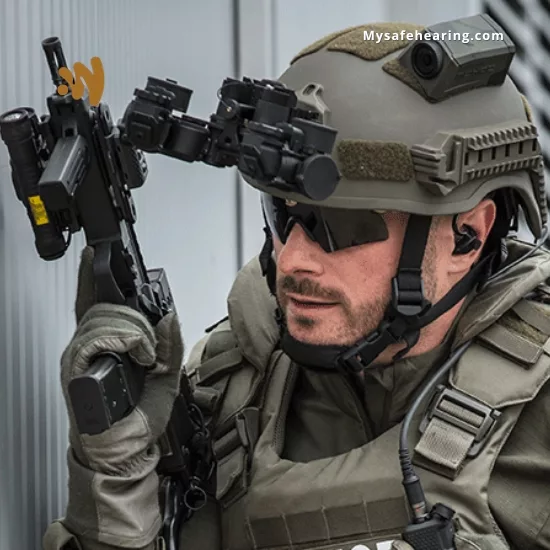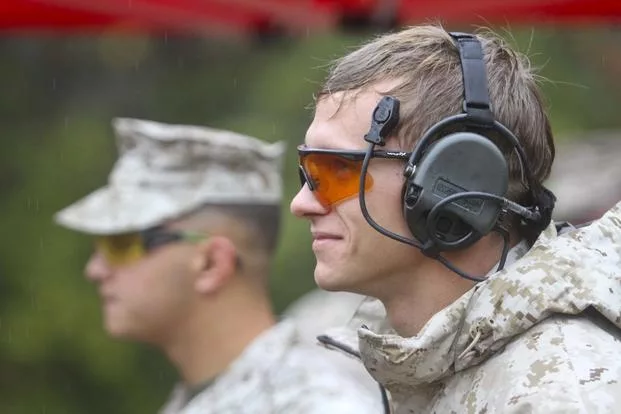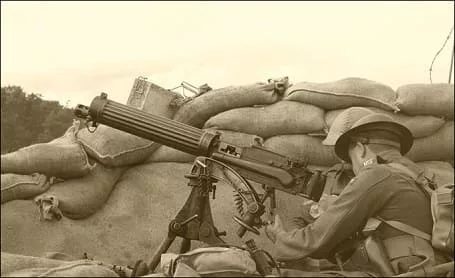
Hearing protection is used by soldiers on the field. This is due to the fact that they must be able to hear directives as well as other critical audio cues.
Depending on the situation, soldiers can utilize a range of various types of hearing protection. Earplugs, earmuffs, and helmet inserts are all common methods of hearing protection.
The type that is used depends on what is needed. For example, if a soldier needs to be sensitive to audio cues, such as the sound of someone sneaking up behind him, he would wear earplugs or helmet inserts.
He would wear earmuffs if there’s a loud noise like an explosion or gunshot since they provide maximum protection against loud noises and allow him to communicate with his fellow soldiers without them constantly needing to ask, “What?” If it’s somewhere in between (such as patrolling the jungles of Vietnam), then both types of hearing protection can be worn simultaneously.
Here are several specific examples of hearing protections:
- Earplugs: disposable cylindrical devices inserted into the ear canal
- Earmuffs: devices consisting of sound-attenuating cups fitted over the ears
- Helmet inserts: hard plastic or metal supports built into a helmet that helps to protect the head and reduce noise levels.
Does the military use ear protection in combat?
Yes, the military uses hearing protection for combat. This is to protect soldiers’ hearing and ensure that they can hear their surroundings better.
Soldiers usually wear earplugs but may also wear earmuffs or helmet inserts depending on what works best for a certain scenario.
When do the military use hearing protection, besides combat?
Soldiers often wear hearing protection when dealing with heavy machinery such as tanks and helicopters since they require a good amount of noise-canceling properties in order to function properly.
When firing guns, there’s an incredibly loud bang and lots of sound pressure (you can even feel it inside your body!), so soldiers will often use both types of hearing protection at once when in the field.
Also, they’ll wear hearing protection when in a very loud environment, such as the engine room of a ship or around an explosion.
A soldier takes off his helmet with earplugs inserted. Some soldiers may choose to wear one or both types of hearing protection at once during certain times throughout the day.
For example, some units conduct drills using live munitions. In contrast, others don’t, so individual soldiers can decide whether they want to use earplugs and earmuffs depending on their comfort level and what is needed for that particular drill.
Sometimes, it’s used due to noise-induced hearing loss concerns (since our ears still haven’t adapted to modern technology). Soldiers must be able to hear verbal sounds and may often wear earplugs or earmuffs during training activities.
What ear protection do Navy Seals use?

Since Navy Seals are an elite group of soldiers that conduct high-stakes missions such as hostage rescues and killing al Qaeda operatives, they often utilize the best gear available.
These include top-of-the-line hearing protection such as custom molded plugs and molds to fit over their ear canal or custom inserts designed for combat situations.
They also utilize other forms of protective equipment, such as tactical helmets and ballistic eyewear.
Do Special Forces use hearing protection?
Yes, Special Forces are similar to Navy Seals in that they conduct military operations in high-risk environments. To do their jobs effectively, they need the best gear possible, which includes hearing protection.
Depending on what is needed for a particular scenario, Special Forces personnel may choose to wear earplugs or earmuffs while out on missions and during training exercises.
What headset do special forces use?
Special forces use tactical communications headsets that feature noise-canceling properties and a high degree of durability. These headsets are usually built into the helmet to allow soldiers to hear verbal commands from their superior officers and listen for suspicious sounds in their surrounding environment.
This provides maximum situational awareness, allowing them to react quickly to any changing conditions or situations.
Do Marines use hearing protection?
Like other branches of military service, including the Army and the Navy, Marines must follow certain guidelines regarding protecting their ears.
This includes wearing hearing protection such as plugs and muffs while firing weapons and operating heavy machinery like tanks and helicopters since these vehicles require noise-canceling to function properly.
What kind of hearing protection do marines wear?
Marines wear a combination of earplugs and earmuffs depending on what’s needed for a specific scenario. They may wear both types at once during certain drills, such as firing weapons or utilizing machinery/heavy equipment.
Many also utilize tactical communication devices designed for advanced noise-cancellation
Do soldiers wear ear protection in WW2?

The U.S. Armed Forces during WW2 used hearing protection and had even developed a “silent” tank by 1944 capable of sneaking up on the enemy.
Soldiers were equipped with earplugs, and one study showed that about 74% of the soldiers surveyed reported using them more than once during combat (Shargorodsky).
The Army Air Corps also created earplugs to protect soldiers from airplane noises such as engines, bombs, gunfire, etc…
How much does it cost to customize ear plugs?
It depends on which type of hearing protection is desired – custom molded earplugs are around $100 a pair, but custom-fit earmuffs are around $250-$300 a pair.
Whether or not the military uses hearing protection, you should also consider wearing some. At Howard Leight, you can find a wide variety of affordable hearing protection available both online and in-store.
Are earplugs OK for a shooting range?
Yes. Ear plugs are ideal for shooting ranges since they help protect your ears without muffling everything or distorting noises like an earmuff might.
Conclusions
Hearing protection is important for anyone who spends time in a loud environment, whether you’re a soldier on the battlefield or just someone who likes shooting at the range.
Investing in high-quality hearing protection can help you preserve your sense of hearing for years.